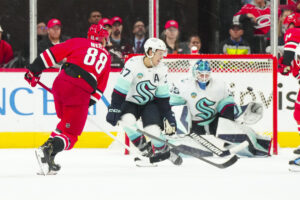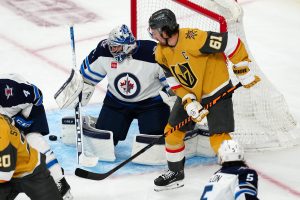The Franchise Best Series comes to you to dive into the all-time best single season for every organization. This, of course, includes post-season results. Join us for a look back at some of the most memorable moments in each franchise’s history. Here is the Detroit Red Wings best season.
Detroit Red Wings 1951-52 Season
The Previous Year Pre-Season Additions
The Red Wings lost in the semifinals of the 1951 Stanley Cup playoffs and where they were shocked by the Montreal Canadiens. Detroit missed a great opportunity to add another title and were not going to let that pass again.
The Red Wings picked up Tony Leswick from the New York Rangers for Gaye Stewart on June 8, 1951. Leswick may not have been a prolific scorer like the known stars on the Wings, but he did provide nine goals and nine assists for 18 points and provided toughness and defensive play.
He also chipped with three playoff goals in Detroit’s run to another Stanley Cup. Leswick became part of a checking line with Glen Skov and Marty Pavelich.
Detroit also made a pair of minor deals for Doug McCaig and Bert Hirschfeld, but neither made the roster. The Wings did get $75,000 in cash after dealing a handful of players to the Chicago Blackhawks.
Key Storylines
Decade of Dominance
The 1951-52 Detroit Red Wings season was the peak of a decade of dominance for the club. Detroit finished at the top of the standings eight of nine seasons and won four Stanley Cups. Two of those title victories came in overtime of Game 7 in the Final. Detroit comfortably won the President’s Trophy by reaching the 100-point mark.
Hall of Fame Lineup
The Red Wings put four players on the NHL first team with future legends like Gordie Howe, Ted Lindsay, Red Kelly and Terry Sawchuk. Sid Abel and Alex Delvecchio were on their way to having Hall-of-Fame careers.
Howe led the way with 47 goals and 39 assists for 86 points in the regular season to win the Art Ross and Hart trophies. Lindsay notched another 30-goal season and added 39 assists for 69 points. Abel topped the 50-point mark and Kelly contributed 16 goals and 31 assists for 47 points.
Sizzling Sawchuk
However, the most dominant performance may have come from Sawchuk. The Winnipeg native claimed his first Vezina Trophy with numbers that were straight out of the Dead Puck Era. Sawchuk went 44-14-12 and registered a 1.90 goals-against-average and 12 shutouts.
This performance came after Jack Adams ordered the goalie to lose weight in the off-season. Sawchuk dropped 40 pounds and his play was stellar. However, he saved his best play for the playoffs where he went 8-0 with four shutouts. The Red Wings did not surrender a goal on home ice in the playoffs.
Top Scorers
As mentioned before, Howe was the team and league’s top scorer. He added two goals and five assists for seven points in the playoffs. Lindsay and Metro Prystai also notched seven points, with Lindsay being the team’s leading goal-scorer with five.
The Legend of the Octopus
Most hockey fans associate the franchise with the famed octopus. However, this is the year that the tale took shape.
It all started on April 15, 1952, when brothers Pete and Jerry Cusimano of Detroit’s Eastern Market tossed the cephalopod onto the ice at the old Olympia Arena. The eight arms symbolized the eight playoff wins needed to win the Stanley Cup.
The practice has carried ever since, and the octopus has been a second mascot for the franchise.
In-Season Additions
Johnny Wilson was the main addition for the team as finally solidified a full-spot with the club. He’d previously bounced between the Red Wings and the Indianapolis Capitals of the American Hockey League the past two seasons.
Wilson was a big contributor in the playoffs as he totalled four goals and an assist for five points in eight games.
Playoff Performers
All the Hall of Famers stepped up and performed big in their perfect run. Howe, Lindsay and Prystai each scored seven points, but Sawchuk was the real star with a 0.62 goals-against average. He only gave up five goals for the entire postseason. Sawchuk surrendered just two goals in the final versus the Habs and none after Game 2.
End Result
Detroit’s domination was arguably the most dominant playoff run in the Original Six era. The Red Wings swept both the Toronto Maple Leafs and the Canadiens on their way to the title. They were the first team to go a perfect 8-0 in the playoffs.
Hall of Fame general manager Jack Adams didn’t have to do much tweaking of the roster and HOF coach Tommy Ivan made all the right moves.
It was the fourth straight season that the club finished with the best regular season record. The franchise would add titles in 1954 and 1955 to finish up their long period before going 42 years before their next title.
Others Nominees
The 1997-98 team that repeated as Stanley Cup champions swept past the Washington Capitals in the final. Detroit won the title despite not having Sergei Fedorov for 59 games and losing Vladimir Konstantinov in the off-season after a limousine accident. It was the No. 6 All-time team on NHL.com’s recent poll of the NHL’s greatest teams.
The 2001-02 team also hoisted the vaunted silver chalice with a roster loaded nine Hall of Fame players. General manager Ken Holland addressed the needs of scoring by getting Brett Hull and Luc Robitaille and goalie Dominik Hasek. The team handled the gigantic expectations to win the Cup.
Detroit’s 2005-06 team would have gotten strong consideration but were shocked in the first round by the Edmonton Oilers. Their inexperience showed, and they were ousted in six games.






